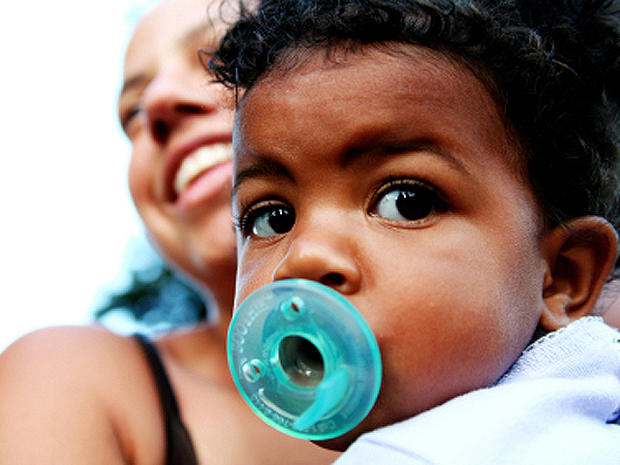Pacifiers may hinder males' emotional growth
(CBS News) New research suggests pacifier use may have long-lasting behavioral effects on a boy's emotional growth.
Three separate experiments - two with college-aged students and one with 6 to 7-year-old boys - revealed that those who reported using pacifiers found it harder to mimic emotional expressions or scored lower on emotional intelligence tests. The study is the first to connect pacifiers with psychological effects.
"That work got us thinking about critical periods of emotional development, like infancy," lead author Dr. Paula Niedenthal, a psychology professor at the University of Wisconsin in Madison, Wisc., said in the press release. "What if you always had something in your mouth that prevented you from mimicking and resonating with the facial expression of somebody?"
According to the researchers, people mimic expressions and body language either consciously or unconsciously. Mimicking can teach them what certain words mean through facial expressions and voice intonations, which is specially in babies.
"By reflecting what another person is doing, you create some part of the feeling yourself," Niedenthal said. "That's one of the ways we understand what someone is feeling - especially if they seem angry, but they're saying they're not; or they're smiling, but the context isn't right for happiness."
But, the researchers believe when a baby has a pacifier in his or her mouth, they can't copy the expressions or emotions they are feeling. Similar experiences have been displayed in people who use Botox. Those who use the treatment report a smaller range of emotions and have a harder time labeling emotions on other people's faces.
The Mayo Clinic adds that pacifiers, while they can soothe babies and help them fall asleep, can also cause problems with breast-feeding, increase the risk of middle ear infections and lead to dental problems. In addition, children who use pacifiers to sleep may become dependent on them.
The study, published on Sept. 19 in Basic and Applied Social Psychology, consisted of three experiments. First researchers found that 6 and 7-year-old boys who spent more time with pacifiers were less likely to be able to mimic facial expressions shown on a video. In another experiment, college students took a test measuring emotional intelligence that analyzed how they made decisions based on other people's emotions. Men who reported using pacifiers more had lower scores. Finally, out of a group college-aged men, those who used pacifiers more often during childhood scored lower on a perspective-taking test, which researchers use to measure empathy.
However, pacifier use did not seem to affect the girl's emotional results.
"What's impressive about this is the incredible consistency across those three studies in the pattern of data," Niedenthal said. "There's no effect of pacifier use on these outcomes for girls, and there's a detriment for boys with length of pacifier use even outside of any anxiety or attachment issues that may affect emotional development."
The researchers believe that because emotional sensitivity is a valued trait for girls and not for boys, parents might go out of their way to teach girls how to interpret and express emotions. Girls may also develop emotionally faster than boys, or boys may just be more reliant on learning facial mimicry so any disruption causes more damage.
The Los Angeles Times pointed out the study methodology is a little shaky, especially because pacifier use was self-reported. But, the researchers argued that because the results are the same for all three studies, people should pay closer attention to how much they are giving their boys their pacifiers.
Researchers want look into why girls are less affected by pacifier use and learn exactly how much pacifier use is bad for emotional health.
"Parents hate to have this discussion," Niedenthal says. "They take the results very personally. Now, these are suggestive results, and they should be taken seriously. But more work needs to be done."
